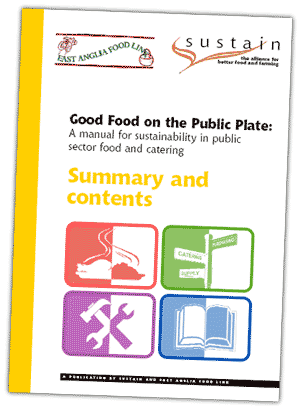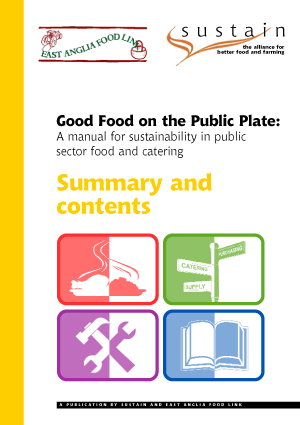Reports • Good Food on the Public Plate
Good Food on the Public Plate: A manual for sustainability in public sector food and catering
This comprehensive 292-page manual is presented in five parts, for those wishing to introduce better quality and more sustainable food and practices into public sector catering for schools, hospitals, care settings and government food procurement. Developed by Sustain and East Anglia Food Link, the publication includes a review of food and catering in the public sector, considers what the benefits of 'sustainable food' are, has a detailed exploration of the procurement legislation and guidance for producers and suppliers wishing to supply the public sector. It also contains extensive guidance for purchasers, advice on good catering practices, a toolkit with recipe ideas and seasonality charts, a model sustainable procurement strategy, model checklists, and a directory with over a hundred links to useful organisations.
 This comprehensive 292-page manual is presented in five parts, for those wishing to introduce better quality and more sustainable food and practices into public sector catering for schools, hospitals, care settings and government food procurement.
This comprehensive 292-page manual is presented in five parts, for those wishing to introduce better quality and more sustainable food and practices into public sector catering for schools, hospitals, care settings and government food procurement.
Developed by Sustain and East Anglia Food Link, the publication includes a review of food and catering in the public sector, considers what the benefits of 'sustainable food' are, has a detailed exploration of the procurement legislation and guidance for producers and suppliers wishing to supply the public sector. It also contains extensive guidance for purchasers, advice on good catering practices, a toolkit with recipe ideas and seasonality charts, a model sustainable procurement strategy, model checklists, and a directory with over a hundred links to useful organisations.
Each year, Government spends around £2 billion of taxpayer's money on providing food and catering services in public institutions such as schools, hospitals, social services and a wide range of government departments and agencies. It is estimated that there are around 61,500 public sector
outlets, and some 1.8 billion meals are served annually.
Unfortunately, most public sector food and catering undermines - rather than underpins - the three pillars of sustainable development: economic, environmental and social:
- British farming and food industries receive little benefit, and overseas producers do not fare any better, as very little public sector food and catering is fairly traded.
- Environmental standards are rarely incorporated into contracts, so public sector food may be produced in ways that pollute the environment, endanger wildlife, waste energy and undercut animal welfare standards.
- Nutrition standards are low, with cheap, low quality ingredients commonplace, jeopardising the health of those in society - children, older people, low income groups, and the ill - who need and deserve the most nutritious food.
But change is in the air. This manual aims to build on invaluable work by Sustain members and others and accelerate the pace of that change. The comprehensive manual sets out:
- The legal position - at global, European, national and local level - and shows that, far from prohibiting sustainability, some laws actually support improvements.
- Government policies across the board that already support the integration of sustainable development into public spending, including on food and catering.
- The many further benefits - to the economy, the environment and to public health - that could be gained from changing to 'greener' public sector contracts and practices.
The manual also makes recommendations to government on how it could help to make healthy and sustainable food the sensible and affordable way forward for public sector catering.
PROGRESS UPDATE (2012): Since this report, Sustain has supported the Greater London Authority and local authorities in London Boroughs to increase their use of healthy and sustainable food. This work has been undertaken as part of Good Food on the Public Plate project and the Good Food Training project.
In 2010, we are proud to report that the Greater London Authority family of statutory organisations (police, fire brigade, transport and City Hall) committed to adopting a sustainable food policy in line with the London 2012 Food Vision, to which Sustain also contributed extensively. In 2011, this was followed by the welcome news that national government had also adopted compulsory Government Buying Standards for food served in Central Government, representing one third of public sector food.
Sustain was also invited to help design and support implementation of food standards for the London 2012 Olympic and Paralympic Games. For background, see: www.sustainweb.org/olympicfood - and for the Food Legacy project, inspired by the London 2012 Food Vision, see: www.foodlegacy.org.
In addition, millions of pounds of local authority food buying is now spent on sustainable food due to the work of Good Food on the Public Plate and the Food for Life Partnership. The increase in uptake of healthy and sustainable food by London's local authority procurement is tracked in London Food Link's Good Food for London report.
In 2012, Sustain launched the Campaign for Better Hospital Food. Please get involved to help win compulsory health and sustainability standards for food served in hospitals!
Good Food on the Public Plate manual contents
Section One: Summary and contents (21pp)
Foreword
How to use the manual
Summary
Section Two: Sustainable Food in the Public Sector (89pp)
1. Introduction
- Sustainable food and catering in the public sector
- Policy contexts
- A definition of sustainable food?
Case Study
The New North Florida Co-operative
2. Benefits of sustainable food
- Good business
- Local economic development
- Better health
- Environmental protection
- High animal welfare standards
- Fair trade
- Taste, variety, and cultural richness
Case Studies
Cornish schools
Garstang Fair Trade Town
3. How public procurement works
- Contracts and the contracting process
- Legislation
Case Studies
Powys Public Procurement Partnership
Italian school meals; Venice and Comune of Meruzzo
4. Size and scope of the public sector
- Buyers and providers
- Suppliers
Case Studies
Somerset schools
Cornwall Partnership Trust
5. How do we achieve public procurement and provision of more sustainable food?
- Issue appropriate guidance and strategies
- Involve stakeholders
- Provide education and demonstration
- Retrain canteen staff
- Invest
- Increase food and catering budgets
- Change procurement legislation
- Change the contract process and specifications
- Use assurance schemes and protected food names
- Develop a sustainable food culture
- Summary of recommendations for government
Case Studies
CIVAM Bio Du Gard and Manger-Bio project, France
St Peter's Primary School, Nottingham
Section Three: Guidance (53pp)
1. Guidance for producers and suppliers
- Develop you own sustainability policies
- Be informed of opportunities
- Contact the purchaser
- Research what will be required in a contract
- Gain business support
- Express an interest and qualify
- Prepare to make a bid
- Ensure food safety
- Make a bid
- Fulfil the contract
Case Studies
Hollesley Bay Prison Farm, Suffolk
Wiltshire Regional Producers Network
2. Guidance for purchasers
- Adopt a sustainable procurement policy
- Develop appropriate selection criteria, operating standards, and specifications
- Adopt a whole life cost approach
- Do not discriminate against local and smaller suppliers
Case Studies
Gloucester City Council
Belfast City Council
3. Guidance for caterers
- Develop more sustainable menus
- Train staff
- Ensure food freshness and safety
- Prepare and present food in appropriate ways
- Use appropriate kitchen facilities and equipment
- Reduce and recycle packaging and food waste
Case Studies
South Gloucestershire schools
Stibbington Environmental Education Centre, Cambridgeshire
Section Four: Toolkit (61pp)
1. Model sustainable procurement policy statement
2. Model contract specifications, operating standards, and award criteria
3. Checklists
- Sustainability
- Tendering
- Contracting
- Purchasing
- Receiving
- Stocks
- Menus
- Cooking
- Service
- Hygiene and Safety
- Waste
4. Recipe ideas
- Scotland
- Ireland
- Wales
- North East of England
- North West of England
- Midlands
- East of England
- South and South East of England
- South West England
5. Seasonality charts
- Vegetables and herbs
- Fruit and nuts
- Fish
Section Five: Directory (73pp)
1. Assurance Schemes
- Assured Food Standards
- Other baseline schemes
- Organic schemes
- Other schemes
2. Purchasers
- Main food purchasers
- Other government purchasers
- Purchasing consortia and agencies
3. Funders
- UK
- European
4. Useful sources of more information
- International bodies
- European bodies
- National bodies and projects
- UK Government departments and agencies
- UK voluntary bodies and associations
- UK producer/industry associations
- Guides and manuals
- Reports
- Recipe books
- Computer programmes

Good Food on the Public Plate: A manual for sustainability in public sector food and catering
ISBN: 1 903060 27 3 - 292pp - 2004 | 1240Kb
Published Wednesday 1 December 2004
Good Food on the Public Plate: Good Food on the Public Plate (GFPP) provided a wide range of assistance to a diverse cross-section of London's public sector organisations including local authorities, hospitals, universities and care homes, to enable them to use more sustainable food in their catering.